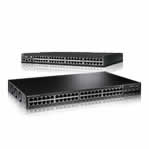Dell PowerConnect 6248P Power Over Ethernet Switch
Dell Updated: 2008-09-10 RSS
Port Attributes
48 10/100/1000BASE-T auto-sensing Gigabit Ethernet switching ports
Power over Ethernet: Up to 15.4 watts per port (External power supply (EPS-470) to supply a full 15.4 watt on all 48 ports.)
4 SFP combo ports for fiber media support
10 Gigabit Ethernet uplink modules (optional)
48Gbps Stacking module (optional)
Auto-negotiation for speed, duplex mode and flow control
Auto MDI/MDIX
Port mirroring
Flow-based port mirroring
Broadcast storm control
Performance
Switch Fabric Capacity up to 184 Gb/s
Forwarding Rate up to 95 Mpps
Up to 8,000 MAC Addresses
256 MB of CPU SDRAM
256MB of CPU SDRAM
32MB of Flash Memory
Availability
Spanning Tree (IEEE 802.1D) and Rapid Spanning Tree (IEEE 802.1w) with Fast Link Support
Multiple spanning trees (IEEE 802.1s)
Supports Virtual Redundant Routing Protocol (VRRP)
External redundant power support with PowerConnect EPS-470(sold separately)
Cable diagnostics
Optical transceiver diagnostics
Layer 3 Routing Protocols
Static routes
Routing Information Protocol (RIP) v1/v2
Open Shortest Path First (OSPF) v1/v2/v3
Classless Inter-Domain Routing (CIDR)
Internet Control Message Protocol (ICMP)
ICMP Router Discover Protocol (IRDP)
Virtual Redundant Routing Protocol (VRRP)
Address Resolution Protocol (ARP)
Internet Group Management Protocol (IGMP) v2
Distance-Vector Multicast Routing Protocol (DVMRP)
DHCP – Helper/Relay
Layer 3 Routing Performance
Up to 128 RIP Routing Interfaces
Up to 128 OSPF Routing Interfaces; up to 128 OSPF Areas; up to 128 Routing Interfaces per OSPF Area; up to 32 routes for ECMP Routing; up to 2 next hops per ECMP
Up to 128 VLAN Routing Interfaces
Up to 256 Multicast Forwarding Entries
Up to 896 ARP entries; Up to 512 NDP entries
VLAN
VLAN support for tagging and port-based as per IEEE 802.1Q
Double VLAN tagging (QinQ)
Up to 1024 VLANs supported
Dynamic VLAN with GVRP support
Voice VLAN support
Quality of Service
Layer 2 Trusted Mode (IEEE 802.1p tagging)
Layer 3 Trusted Mode (DSCP)
Layer 4 Trusted Mode (TCP/UDP)
Advanced Mode using Layer 2/3/4 flow-based Policies, including metering/rate limiting, marking and bandwidth guarantees; up to 100 ACLs can be used for QoS flow identification via Class-maps
8 Priority Queues per Port
Adjustable Weighted-Round-Robin (WRR) and Strict Queue Scheduling
Port-based QoS Services Mode
Flow-based QoS Services Mode
Layer 2 Multicast
Static IP Multicast
Dynamic Multicast Support – 256 Multicast groups supported in IGMP Snooping
IGMP snooping for IP multicast support
IGMP Querier
Protocol Independent Multicast (PIM-DM, PIM-SM)
Security
IEEE 802.1x based edge authentication -- supports single and multiple host access, guest access, voice authorization, and Microsoft Active Directory
Switch access password protection
User-definable settings for enabling or disabling Web, SSH, Telnet, SSL management access
Port-based MAC Address alert and lock-down
IP Address filtering for management access via Telnet, HTTP, HTTPS/SSL, SSH and SNMP
RADIUS and TACACS+ remote authentication for switch management access
Up to 100 Access Control Lists (ACLs) supported; up to 12 Access Control Entries (ACEs) per ACL
SSLv3 and SSHv2 encryption for switch management traffic
Management access filtering via Management Access Profiles
Other Switching Features
Link Aggregation with support for up to 18 static aggregated links, 8 dynamic aggregated links per switch and up to 8 member ports per aggregated link; LACP support (IEEE 802.3ad), LLDP-MED
Management
Web-based management interface
Industry-standard CLI accessible via Telnet or Local Serial Port
SNMPv1, SNMP v2c and SNMPv3 supported
4 RMON groups supported (history, statistics, alarms and events)
TFTP transfers of firmware and configuration files
Dual Firmware images on-board
Multiple Configuration file upload/download supported
Statistics for error monitoring and performance optimization including port summary tables
BootP/DHCP IP address management supported
Syslog remote logging capabilities
Temperature sensors for environmental monitoring
Chassis
440 x 387 x 43.2 mm (W x D x H)
17.3" x 15.2" x 1.7"
1U, rack-mounting kit included
Approximate weight (without modules): 6.06kg, 13.4lbs
Approximate weight (with modules): 6.20kg, 13.7lbs
Hardware
256MB of CPU SDRAM
32MB of Flash Memory
MIB Support
RFC 1213 MIB II
RFC 1215 Standard Traps
RFC 1286 Bridge MIB
RFC 1442 SMIv2 (SNMPv2 MIB)
RFC 1451 Manager-to-Manager MIB
RFC 1492 TACACS+
RFC 1493 Definitions of Managed Objects for Bridges
RFC 1573 Evolution of Interfaces
RFC 1643 Etherlike MIB
RFC 1757 Remote Network Monitoring (RMON) MIB
RFC 1907 SNMP v2 MIB
RFC 2011 Internet Protocol (IP) MIB using SMIv2
RFC 2012 Transmission Control Protocol (TCP) MIB using SMIv2
RFC 2013 User Datagram Protocol (UDP) MIB using SMIv2
RFC 2233 Interfaces Group using SMIv2
RFC 2618 RADIUS MIB
RFC 2665 Ethernet-like Interface Types MIB
RFC 2666 Identification of Ethernet Chip sets
RFC 2674 MIB for Bridge with Traffic Classes, Multicast Filtering and VLAN Extension (IEEE802.1p/q MIB)
RFC 2737 ENTITY-MIB
RFC 2819 RMON MIB
RFC 2863 Interface Evolution
Standards Supported
IEEE 802.1AB
IEEE 802.1D
IEEE 802.1Q
IEEE 802.1p
IEEE 802.1w
IEEE 802.1x
IEEE 802.2
IEEE 802.3
IEEE 802.3I
IEEE 802.3u
IEEE 802.3x
IEEE 802.3z
IEEE 802.ab
IEEE 802.3ac
IEEE 802.3ad
IEEE 802.3ae
IEEE 802.3ak
Environmental
Operating Temperature: 0º C to 45º C
Storage Temperature: -20º C to 70º C
Operating Relative Humidity: 10% to 90% non-condensing
Storage Relative Humidity: 10% to 95% non-condensing
Power
100-240VAC, 50-60Hz
EPS-470 required to support 15.4 Watts on all 48 ports. (24 Ports supported up to 15.4 Watts without)
Users Guide
Command Line Interface Guide
Related Manuals
Dell PowerConnect 6224P Power Over Ethernet Switch
Dell Powerconnect 3524 Managed Fast Ethernet
Dell Powerconnect 3548 Managed Fast Ethernet
Dell PowerConnect 5424 Managed Ethernet Switch
Dell PowerConnect 5448 Managed Ethernet Switch
Dell PowerConnect 6224F Managed Ethernet Switch
Dell PowerConnect 6248 Managed Ethernet Switch
Dell PowerConnect M6220 Managed Ethernet Switch
Dell PowerConnect 5316M Managed Ethernet Switch
Dell PowerConnect 2708 Gigabit Ethernet Switch
Dell PowerConnect 2716 Gigabit Ethernet Switch
Dell PowerConnect 2724 Gigabit Ethernet Switch